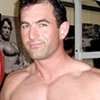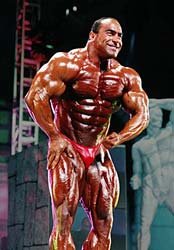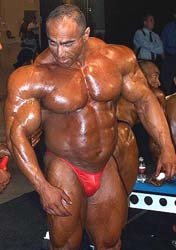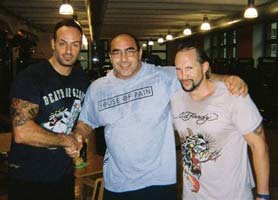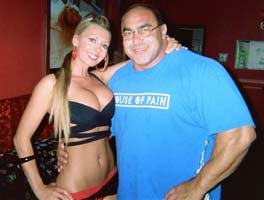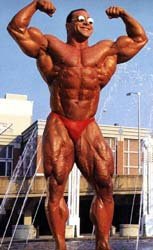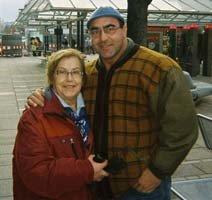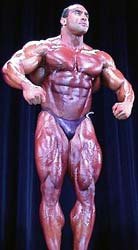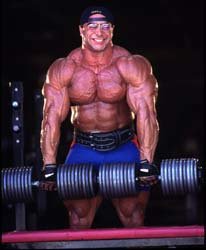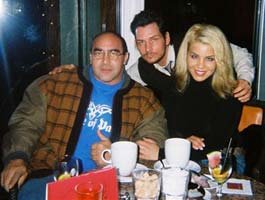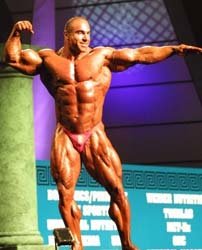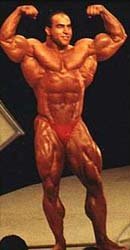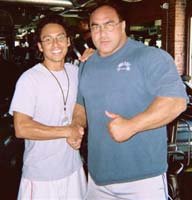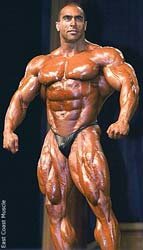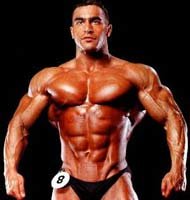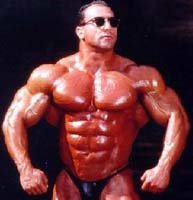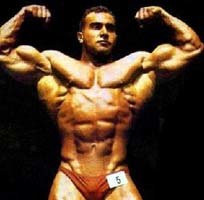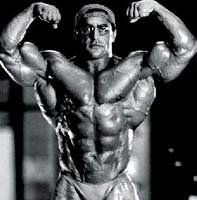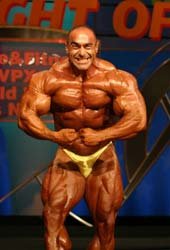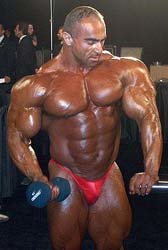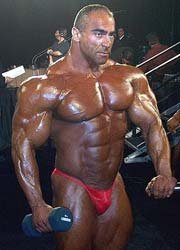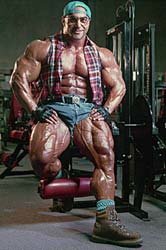| [ Main Page ] |
1990s bodybuilding star Nasser El Sonbaty has distinguished himself as a true champion in several ways, most notably as the largest, freakiest best-proportioned and conditioned pro bodybuilder never to win the Mr. Olympia title.
In finding his calling in an era that rewarded the kind of massive physique he regularly brought to the stage, Nasser was well poised to become Mr. Olympia, and was convinced he had the qualities to do just that.
Coming from a less than auspicious start where he was, in the early 1990s, considered lacking in potential and just another shapeless monster from Europe, the German born Nasser had, by 1997, worked his way into genuine contention for the Mr. Olympia title as exemplified by five pro show wins and six top three placements including third place at both the '95 and '96 Mr. Olympia's. By 1997 he was a legitimate threat to bodybuilding's biggest prize.
As history shows, he lost on that occasion, but only on the official scorecards and under the most controversial of circumstances. Torn and tired, five-time Olympian Dorian Yates, clearly fell behind Nasser in almost every category, yet he won the show with a perfect score.
It has been decisions like this that have intensified Nasser's resolve to tell it like it is, to never hold back on his opinions, a quality that has attracted much criticism and led to him becoming, by his own admission, a persona non grata of sorts, a man shunned by bodybuilding officialdom for speaking when silence is the order of the day. But this is now.
Back in the '90s Nasser was hot property and even considering today's Coleman and Cutler era, retains the distinction of being the largest, most symmetrical bodybuilder of all time.
For a man of his 285-pound-plus size, Nasser, in top condition, presented a physique that threatened to collapse the stage every time he made his way out for the top comparisons, complete with a small waist, excellent abdominal development, and the biggest shoulders this side of Marcus Ruhl along with overall thick, massive, proportionate muscular development.
Yes the guy was very, very good. How good? Over his 16 year professional career, Nasser placed no lower then third in 33 pro shows out of 66 entered, won six including the 1999 Arnold Classic and still walks around today, after 26 years in bodybuilding, at over 300 pounds cut.
Although he has lost interest in competing it is clear that he still loves to train hard, which has led to a heavy demand for guest posing appearances. With Nasser the audience are guaranteed 300-plus pounds with ripped abs.
Not only is Nasser one of the first true mass monsters and one of the few to have presented all of the attributes needed to win the Mr. Olympia, he is also highly educated, a man of many interests, rare qualities for one who regularly competed in the upper echelons of an obsessive sport such as professional bodybuilding for so many years.
With a Masters Degree in Political Science, History and Sociology, along with an ability to fluently speak seven languages Nasser is one of bodybuilding history's more cerebral of iron warriors.
A passionate advocate for bodybuilding and one who believes the media should focus more on the positive side of the sport, rather than all the negative aspects such as drugs, that the public, because of this constant exposure, readily associate with bodybuilders, Nasser, at the same time, is not afraid to speak his mind about anything connected to the iron game.
In today's increasingly politically correct social climate, it is refreshing to hear from someone like Nasser who is not afraid to discuss certain controversial issues, even if they put him offside with bodybuilding officials and fans alike. He tells of what he understands the truth to be, and for many, the truth hurts.
Today Nasser lives a quieter life in San Diego, California, and no longer competes in bodybuilding, instead choosing to use the weights to stay in shape, rather than to again stand onstage in his red posing trunks covered in several layers of pro tan while hitting his famed most muscular shot.
Though conspicuously absent from the competition stage, he is not short on commentary, and in the following interview, the first of two parts, he tells, in his own indomitable style, all about his bodybuilding career, bodybuilding drugs, judging, the future of the sport and much more.

[ Q ] How did you get started in bodybuilding Nasser? What attracted you to the sport to begin with?
I never wanted to become a pro bodybuilder and I never had the desire to look like a bodybuilder when I started out. I was 17 years of age and was playing soccer. At that time I went to a little weight room, which was located next to the soccer field. I just wanted to do some leg presses and some leg extensions in order to have stronger legs for soccer, but at that time I met a former Hungarian weightlifter there that showed me exercises for the upper body, in order for me to have a balanced physique.
He told me that there shouldn't be one body part overpowering the other, not in strength or from the visual aspect. So I started doing bench presses and started training my arms and this went on for about two years until I joined a real gym.
But again the transition from soccer to building my body took me two years. And in these first two years and experimenting with different exercises and learning by watching others how to execute an exercise I started liking it more and more. At the beginning I even hated the too big bodies, the veins of the guys in the magazines and the crazy eating schedule of serious people.
So it happened by accident. And it was never that I was little, was beaten up and started picking the weights up to get back at people. And even today I would rather watch rather a first class soccer game than a bodybuilding show.

[ Q ] What were your initial bodybuilding goals?
My initial bodybuilding goals were just to get stronger in the bench press.
And because I do love art and have a sense for symmetry and proportion I wanted to have an evenly proportioned and evenly developed body—but nothing too big and too covered in veins.
I did not have an idol in bodybuilding or sport in general either. I did not want to look, for example, like Arnold because I realized from my analytical way that as a person he had weak legs, droopy shoulders and a huge waist. I could and to this day can take people apart. I can immediately tell you who has what and where his flaws are, his physical weak points, his strong points.
My further goal wasn't just to get even stronger but also bigger. The aspect of competing came up when other people in the gym asked me if I was competing. They did not encourage me, but as I said, they asked me if I did compete. And this was somehow the trigger point. I wanted to see how good I looked next to the show-offs.
Going to school is a contest within yourself but also you get recognition from the other students as well if you are good. And now I slowly developed an appetite for and to be better looking physically and to be better than the next guy when it came to the look and not just strength.
So my first show was as a junior in a State Show and not just a city show. I came in sixth. I was told at the show that I had the best abs of any one of the junior contestants. And this 6th place gave me more confidence and motivation to continue. Success is always a great motivator.
And maybe subconsciously I became more motivated because of my dad who was very concerned about my grades at school and University and did not like this sport or having me in this environment. He was not supportive regarding my physical progress. My mom was.
Nowadays I am thankful to my dad that he was not supportive. He saw bodybuilders as simply dumb, narcissistic people. And it was, to him, a waste of time, energy and money. I have realized that guys who get lots of help from their dad in bodybuilding mostly go nowhere in the sport.

[ Q ] You seem quite critical of Arnold's physique. Were you ever a fan of his, like so many bodybuilders were, when you were starting out?
Honestly, and not to be arrogant and not to sound degrading, but definitely when I started training I looked at pictures of him and also of other bodybuilders.
I am a pretty analytical person whether it comes to the world and what is going on politically and so on and when it comes to bodybuilders body-parts. Bodybuilders have to realize that they can have very good body parts but it takes all the body-parts to be good together to make a balanced physique.
He (Arnold) was never a person I wanted to look like or to be like. He was definitely somebody who has made fantastic achievements but at the same time, I went to University for many years and am not just reduced to bodybuilding, so there are also other people I admire who are mentally well developed and have achieved in other areas such as the arts, for example. So my perspective when I started lifting weights was not just bodybuilding.
I remember Shawn Ray once saying that when he first touched a dumbbell he knew where his destiny would lie and he knew he would be a pro bodybuilder. When I touched a dumbbell for the first time I didn't like it at all, so people are different when they start out and different at the end.

[ Q ] At what point did you know you could become one of bodybuilding's top champions?
I did my first amateur show in 1985, where I came in 6th place in the junior category of a German State show. My competition weight was 192 pounds.
And in 1990 I did my first pro show/pro debut at the Finland Grand Prix in Helsinki where I came in 8th place. At that time I competed with greats like Padilla, Benaziza, Strydom, Nimrod King, Ron Love, Samir Bannout and I thought that there must be a second category for the pros. One for the established guys and one for new pros like me. Seriously, I was in deep shock.
I qualified for first time for the Olympia in 1993 in Germany and France where I came in third place behind Wheeler (Flex) and Vince Taylor. Until then (from 1990 to 1993) I went from shock to shock. Even through I made it to the top 10 I still needed four years to find myself and realize where I was standing among the pros.
You should never listen to your friends, buddies, and wife and girlfriend regarding how you look. You have to find it out by going from show to show. You can't get robbed in 10 to 15 amateur shows in a row. So it is like trial and error to find out how good you really are. And there was still nobody who took me under his wing or sponsored me and told me how good I would and could eventually become.
In 1994 I came second in the Night of Champions in New York City and 6th at the Olympia in Atlanta, Georgia. Still no immediate contract or contract offer. Ed Connors - the so-called discoverer of talent told me to talk to Joe Weider in order to work as a translator for the Weider Company. But he (Ed) did not see my potential either, regardless of my top-six finish at the 1994 Olympia.
But in 1991 I got from Joe Weider an invite to compete in the Night of Champions in New York City. He paid for my flight and two week stay in the U.S. He had seen photos from my first three pro shows in Europe in 1990. So Joe was at all times the only one who ever saw any further pro potential in me. But again in 1991 I did not finish in the top 15 in New York; my dieting capabilities had yet to be improved.
For most guys, when they enter the pro ranks their bodybuilding careers are basically over. It is a huge difference between being a top amateur and being a top pro. The difference is like day and night.
Finally at the end of 1994 I got a Weider contract from Joe, the most helpful person in my career as a bodybuilder and the only one who saw my potential. And from my second place at the 1994 Night of Champions in New York City I thought: "I can make it" (in the pro ranks).
Nasser's Pro Victories:
- 1995 - IFBB Houston Pro Invitational
- 1995 - IFBB Night of Champions
- 1996 - IFBB Grand Prix Czech Republic
- 1996 - IFBB Grand prix Russia
- 1996 - IFBB Grand Prix Switzerland
- 1999 - IFBB Arnold Classic

[ Q ] You are known for being one of the largest professional bodybuilders of all time and one of the few guys who can guest pose at over 300 pounds with abs. Were you always a larger bodybuilder or did it take a lot of time and effort for you work your way up to your present size?
I started lifting weights when I was 17 years old. My weight was then 85 kilos (187 pounds) and my highest off-season weight has been up to around 330 pounds so I gained some weight, obviously. At the beginning my lower body was better developed than my upper body. I always had calves, quads and hams. They have just been genetically there.
And when it comes to upper body development - I had shoulders and chest already relatively well developed, just naturally without even working out.
The first time in the "gym" I bench pressed 70 kilos (154 pounds) - it was shaky but I still accomplished it. And to date I still have the most symmetrical abs in the history of bodybuilding. And for a six-foot tall guy, my overall symmetry is very good.
The funny thing is, the smaller and shorter the guys are the more they have the tendency to claim that they are symmetrical. And the bigger you are, the less symmetry they like to attribute to you. I guess it has to do with a kind of compensation behaviour short guys have, because most of them just do not have the size. For sure there are exceptions. Still, their genetics are just not good enough (for them) to be a top pro bodybuilder.
I am definitely blessed to have had certain body parts right from the beginning, but it does not mean that I did not have to train hard and harder over the years to get to where I finally fully developed my potential. And another funny thing is that nobody and I mean nobody saw my potential.
I did not have a contract either until I came in 6th place at my first Olympia in 1994. I skipped the Olympia in 1993 in order to look better in this show in ' 94. And I did not have a spokesperson like Ed Connors from Gold's Gym who promoted many guys even if they just did not have it.
Also, for example, Peter McGough, Editor-in-chief of Flex magazine paved the propaganda way for his countryman, Dorian Yates, here in the U.S. when Yates started to emerge from the amateur ranks in the U.K. McGough is, though, besides the Weiders, one of the greatest advocates of the sport of bodybuilding. A lot of guys in the sport including myself owe McGough more then just a "thank you".

[ Q ] In the mid '90s you, almost overnight so to speak, became one of bodybuilding's most promising champions and a legitimate contender for the Mr. Olympia title. How did you make such tremendous progress to go from an unknown in 1990 to one of the main challengers to Dorian Yates's title in 1997?
First of all I went to a German University between May of 1985 and November of 1992 (seven and a half years at the University of Augsburg). So while I attended University I had to, at the same time, work in the semester holidays and also during the week to support myself. Also I was competing already at the pro level. I turned pro in 1990 and my first pro show was the Finish Grand Prix in Helsinki, where I finished in 8th place.
So studying, working out, working, competing, and dieting at the same time required lots of will power, energy and persistence and was definitely not easy.
My dad, who is an engineer and worked for Mercedes Benz for decades, always taught me since I was a child that I had to complete higher schooling in order to have a higher school finish/degree first and foremost for the sake of being adequately educated and secondly in order not to be or at least to be less bossed around later in life. And he said the lower my academic qualifications or results are, the more likely it will be that other people will boss me around. Later I came to understand the real importance of education.
So education was for me always way more important than physical performance or a muscular look. And today I am very grateful to my dad that he basically indoctrinated into me the necessity for education.
My physical improvements did not come overnight and it still took time even if it looks fast to some people. With the years you learn to be more intense and consistent in the gym. And you learn how to get in shape by experimenting with diets.
I did not have anyone in Germany to teach me how to work out, how to diet efficiently without sacrificing less muscle than necessary. And at that time you did not have personal trainers, nutrition gurus and so on around. Also I would not have had the money to afford anything like that either. And as we all do know, most bodybuilders, if they know something, do not want to share the knowledge or "secret" with you. But at the same time, they always want to know what you are doing.
And until today I do have people coming up to me - as soon as they see that I am friendly and nice - who want to extract knowledge and energy out of me. And I did not have, for example, a sponsor at that time like Mike Francois had one before he even turned pro or Jay Cutler who had a Weider contract for two years before he ever entered a pro show.
It is definitively much more difficult to be a non-U.S. bodybuilder and to establish yourself here in the land of bodybuilding. Flights to here, hotels having to be paid for there, the lack of information and the lack of publicity if you are not originally English speaking and not living here: it is like you are coming from outer space. And after I came in 6th place at the Olympia in 1994, I got a contract from Joe a Weider, which allowed me to put even more time and energy into developing my body.
By the way, Joe was the only one who ever offered me a bodybuilding contract. Without him I would have never come as far as I did. He created a bodybuilding superstar hero out of me. He made me known around the whole world by paying the greatest photographers like Chris Lund to take pictures of me. And so, partly because of this, I have lived in Southern California since 1994.

[ Q ] Having controversially lost the 1997 Mr. Olympia title, when many people thought you should have won, how did you take this result and why do you think the judges placed you second?
Yes definitely. That is a fact (I should have won the 1997 Mr. Olympia). When I did not receive the Sandow in 1997 I realized that there is no fair competition (in pro bodybuilding). I realized it earlier but, again, in 1997 it was more obvious than ever before.
In 1994 I came in second at the Night of Champions in New York City. I think that I should have won that specific show, but they let Mike Francois, as the reigning USA champion, take the title.
I was just the unknown, or better, the "unimportant" guy from Europe. The title stayed in the U.S. and Nasser went back to Europe. Besides, another European called Dorian Yates was already holding the Mr. Olympia title.
And to come back to 1997 (Mr. Olympia), Flex Wheeler came to me after the prejudging (which was on a Friday, so that they had the finals on Saturday - in order for them to generate more entrance ticket money in Long Beach, California) and told me backstage if I knew that they would not give me my very deserved title. I did not say too much because I hoped that he was wrong. But as we all know, Dorian Yates won the Olympia again, the very next day.
He won despite a huge belly (looking like he was pregnant in the sixth month), a waist like a drum, a torn up left biceps, a freshly torn left triceps, a quad tear left, a quad tear right, a torn right hip.
He won it with a perfect score, which was just unbelievable. This was a completely staged outcome and the biggest bodybuilding robbery of the 20th century by the clique of judges who "judged".
I also have to say that some judges had Dorian Yates even in third and fourth place, because about 13 judges judged officially. I think you just use seven of the score sheets. But these judges' (who scored Dorian lower) score sheets had not been used and some of the judges' had then been removed from the judging panel because they did not produce what was expected of them to produce.
There are multiple reasons why I did not win. Some judges did not want to upset their friend Dorian and they did not want him to go out of bodybuilding with a defeat after all his injuries and tears. They did not want to give another non-U.S. guy the most prestigious title in bodybuilding because it would underline the U.S. inferiority in bodybuilding compared to non-U.S. athletes.
Then definitely another reason is that I am so outspoken and not just an order follower. That I say how it is, and do not brown nose and make phone calls in order to "secure" a placement like so may others who play the official tough guy.
I have no problem calling people up, but not for the sole purpose of placing here and there in a certain spot. And I am, for too many people, far too educated and too intelligent. And they realized I could be a danger to them if I was the new titleholder.
And last but not least, when people saw my body they figured they couldn't achieve that. Before doing this they would rather be dead. So I was also physically too freaky and too big, even for pro bodybuilding. And I was also critical about judges and co-competitors and did not deny it when I was questioned about that.

[ Q ] You say your physique was too freaky and too massive; sounds like you were ahead of your time. How would you personally describe your physique and just what made you the best bodybuilder onstage at the 1997 Mr. Olympia?
The best proof of my superior physique over everyone else's physique can be seen on the 1997 Olympia tape. This says it all. But I would still like to make some statements.
I had, compared to 1997 Mr. Olympia title winner, Dorian Yates, the better built and the better, god given genetic structure with even nicer looking veins. I did not have one torn muscle like he had so many, many torn muscles. My body is more proportioned and more, way more symmetrical.
I had the better waist (also the best V-taper, shoulders/waistline), better and tighter abs, paper thin skin, better triceps, better biceps, better shoulders, better chest, better hams, and better quads. I was tighter, harder and fresher in appearance (because I did not have a couple of week-old triceps tears which had not even been attempted to have been fixed surgically, otherwise Yates wouldn't have been able to step on stage).
Then I heard the big BS—"... but Dorian had him (Nasser) from the back." The only body part I give Yates when he supposedly had me was his tremendous lower back development but not his thickness or back width.
The Olympia is not a lower back contest. An Olympia title is not to be given out to the best lower back—otherwise why do all of us still train all of the other body parts?
My general opinion of that show, the 1997 two-day Olympia, is that I got robbed live in front of thousands of people but with no consequences for anyone but me and a few judges who did not judge according to that which was expected of them, that what was suggested to them.
If I would have won the Olympia back then, I would have won it for a couple more years straight with the body, dedication, drive, willpower and desire I had at that time. I got robbed for at least five million U.S. dollars—to give a low number estimate when I am counting all the missed endorsements and opportunities connected to the Olympia title. I got so badly cheated. My trust will never ever be the same. The lost trust is beyond possible repair.
From the six Mr. Olympia titles Yates got, I do believe that he just deserved to win half of them. An Anglo-Saxon name and a Peter McGough in the Weider office in Woodland Hills, California was definitely a good investment from Yates's side regarding his titles and his aspirations. And if Yates didn't have so much pressure on him after the '97 Olympia, Yates would have tried to compete again at the 1998 Olympia in New York City. For sure Yates would have expected another Olympia title with possibly an even more fixed up and deteriorated physique.
Also regarding judging: I do completely understand that people like Vince Taylor, Shawn Ray and also Kevin Levrone, Chris Cormier, Lee Priest, Dave Palumbo, Matt Mendenhall also got very fed up regarding the cheating, political manipulations and the games we, as bodybuilders, have been part of.
Being robbed—so obviously—and eating and taking sh!t for so many years is also very hard. It takes almost the skin of a machine to digest all these more than controversial decisions to take, to regroup, to focus again and continue fighting - and sometimes fighting against a wall.
Up to a certain point you can't just train even harder when the decision is already made beforehand. And I have been bodybuilding for 26 years, and competing for 22 years in a row. I am not just misguided or paranoid. I am pretty logical and observant. And it does not take too much intelligence to realize that sometimes things are not as they should be.
By the way: in the 1997 Olympia, three results in the top six got changed. They said that a mistake was made. So they said at the '97 Mr. Olympia banquet that three guys got the information that their results changed for the worse. So even later, the original official 1997 Mr. Olympia tape (with the top six onstage) had to be re-arranged within the new placements.
I was the Arnold Classic runner up in 1997 and 1998. I won it in 1999—finally. Levrone had his posing trunks on back to front - which I guess can happen but he received the most muscular trophy notwithstanding the fact that I was 287 pounds onstage and he was approximately 50 pounds lighter than me. Then Levrone thought that he won the show as well—but I did.

[ Q ] With a competition record of 13 amateur and 66 pro show appearances and six pro wins, statistically you are one of professional bodybuilding's best competitors. What has been your greatest moment as a professional bodybuilder to date and why?
My first three pro shows were the Helsinki Pro, the French Pro, and the Dutch Pro - all in 1990. So, I have competed in 66 shows in total. And I finished in the top three in 32 or 33 pro shows! And as you stated correctly I won six pro shows, three in Europe and three on U.S. soil.
I would like to mention here that I was officially disqualified in 1996 after my third place finish at the Olympia where I got a standing ovation, by the way. The disqualification was because of the use of diuretics. I lost my official third placement and had to return my approximately 35,000.00 U.S dollar prize money.
I am still angry at the inconsistency of judging from the top of the NPC and the U.S. because my well-deserved prize money was taken away from me, my third place not accepted (and I should have been either first or second). And I tell you why: in 2001 Jay Cutler came in second place at the Olympia in Vegas. Two days before he said personally to me that he would be happy to achieve a top 10 finish at the Olympia. But he came in second because he was using a bunch of banned diuretics. Now he was close to Ronnie Coleman.
So Cutler had a big loud mouth and threatened them to sue them if they would strip from him his second place and the prize money. But I, Nasser El Sonbaty, the nice guy, was punished for that in 1996 because I was not nasty acting or verbally aggressive.
So why do we have different measures for the same thing? And Cutler should have known better, especially five years later. Cutler's action catapulted him - because of "his way" of cheating and his confronting them and threatening them - to the top of the bodybuilding world and rankings. No consequences but good consequences for Cutler
The consistency of the U.S. here is the inconsistency of their actions. This organization cheated me again. And I should just continue like nothing happened and think that everything is right?

[ Q ] In 2004 you resumed competing after a two-year break from bodybuilding competition. Yet you slipped back in the placements. What were your bodybuilding goals in '04 and '05? Did you achieve what you set out to accomplish over this period? And are there any more pro contests ahead for Nasser?
After being robbed and cheated so many times so obviously, so that even guys who beat me apologized for placing ahead of me, I am momentarily zero motivated to step onstage again.
For example, just to mention one show, I beat Levrone in the first and second round by two digits. But he matched me in the posing, so there was a tie. And then I lost in the end, because of the computer (scoring). This is so ridiculous. Levrone won again. Wow - what a surprise, but again at my expense.
But it is not about Levrone or this or that guy - it is about the judges. One foul apple can make them all bad. Some judges are drunk while judging, some are drug addicts, some just don't care and some are not from here and judge accordingly (to what they are told) because they are from outside the U.S. and they do not want to get into an argument with another judge because of a competitor. Otherwise they would have had their last paid trip to the U.S. And some just do not get the green light to judge again because they judged outside of the expectation circle.
I am not saying all judges are bad and oblivious, but a certain percentage of them should not be judging and do not even have a judging, or drivers, licence. Most of the pro judges are, towards me and on a one-on-one basis, polite and friendly.
But my experience of competing so far for 17 years in the pro ranks tells me otherwise when they are sitting together and judging. You can impeach the president of the U.S. but not the (pro) bodybuilding judges. You never hear them admitting a mistake or failure.
On top of that I have been on pre-contest diets for approximately 18 years. And living a deprived life like that for so long takes a toll: a toll on your family, your friends, your lifestyle, and educational possibilities. And in some cases you really do not get too much out of it, except for being robbed. And some guys have been robbed and are having life long health problems. We do have enough bodybuilding victims in the sport.

[ Q ] So what did happen in 2004 and '05? Why did your place so low?
The last couple of shows I entered, actually the last three or four shows I did, I did not look my best. Way off from the typical, hard Nasser look.
In 2003 I had to go to hospital because I had a Staph infection in my right shoulder. I was at that time about two weeks out from the Night of Champions. I was hospitalized for ten days and when I came out I had lost over 60 pounds. I almost died.
Anyways, I still tried to get back in; in 2004 and 2005 I ultimately came in between 14th and 15th place at three shows. Not satisfactory at all, but at that time my motivation was also not as good as in previous years, I felt regardless of how good I looked they still would not judge me correctly - as usual. I still feel today that I was the most critically judged top pro ever.
I definitely would have fewer problems if I were less smart, more kiss @ss and if my name was instead of "Nasser" something like "Jack Jackson" or "John Johnson". I did not diet either as strictly as I could, should and normally would have, had I dieted properly.
And another point I would like to make here is that in the 66 pro shows I entered between 1990 and 2005, over a period of 16 years, there was not one so-called judge from one of my so called original home countries like Yugoslavia or Egypt.
Yes, I was born in Germany but the German judges did not view me as being "German", and my passport was from Yugoslavia. Imagine now what kind of circus people like Shawn Ray or others like Cutler, Coleman, Levrone or Cormier, would have created if in all their pro shows would have never ever been judged by a U.S. judge. In my case it was just normal.
It is not that I needed an ally in the judging panel, but why is it okay that sometimes, from 13 pro judges who judge a show, it is so normal to have at least 70 to 80 percent of the judges from the U.S.? This is so unfair that it stinks to the ultimate extent.
By the way, I do know for a fact that some pro judges from Germany had later been disallowed to judge shows like the Olympia because they did judge differently than was expected. And believe it or not, in some Olympia's I was the only non-U.S. competitor out of the top ten. I got more discriminated in the judging process then any other top competitor. This is definitely very motivational.
Generally speaking, there is no good news at all regarding any changes when it comes to the issue of judging. Also I do guarantee that each show would have almost a different outcome every time if the judges were not allowed to speak to each other after the pre judging.

[ Q ] How does bodybuilding today compare to how it was in the '90s? What are some of the main changes you have seen?
Personally I do not see any dramatic positive changes. There are still too many of the old judges in place. They still have the same attitude and a lot of them have the outcome of the show pre-decided in their head before the show even begins.
The prize money is up in the Olympia and the Arnold Classic, but for the smaller shows the prize money is still the same or actually even worse if you watch the inflation rate.
Also the prize money in shows like the Olympia and Arnold Classic is still too low compared to any other sports given what the bodybuilders are going through to get in ultimate, almost near-death condition. Fewer bodybuilders have contracts today. This is when it comes down to the total number of contracts and the paid sponsorship contract money.
I do not see any substantial improvements in prize money when it comes to the females in the sport. Even if some judges and others find women's bodybuilding unattractive, it is still very hard work for the women athletes as well. Fitness will die out because the girls are getting older and it takes a toll on their wrists, tendons - all the jumps - and they are still underpaid.
Figure is getting bigger and bigger. Because you can train for one year and you can already be at the national level. And so many girls who do not have it like to do it because they like to expose themselves and again you do not have to train as hard as in bodybuilding and fitness.
Figure is the biggest money-maker for the manufacturing suit companies, beauty article accessories companies, the NPC. So they will encourage more and more figure girls to compete. And the encouragement does not even need to be money - just a picture in the magazines or on the Internet. We will soon have at the USA's and other national shows 500 plus figure competitors. An invasion of the colourful suit spiders.

[ Q ] If figure is, as you say, the future for female competitors, what will become of women's bodybuilding?
I have spoken to a lot of NPC judges who have told me that they really don't care if a girl has a well developed arm or if her calves are smaller or bigger or if they are proportioned or not. They just care for t!ts and @ss. And as long as she looks good that is what they care all about.
They are not really impressed if a competitor is in shape or with their physical or muscular achievements onstage or offstage. And a lot of them look more muscular than even the judges are so the judges, especially the male judges, don't think it is necessarily an appealing thing.
They would rather prefer one of the figure girls because they look more attractive to them physically. It's just a physical thing. Some judges are not really going there to judge an amateur show, let's say the USA's or National's, to really see how good she is for sure, but subconsciously they always check the female out, how she looks.
When it comes to you or me or any male guy, if we see a girl who has a really muscular body but the face is not that good or even she may needs to shave her face, you would rather prefer a girl who is maybe less muscular and less hard but more feminine and appealing in the face and with less muscles in general.
That's what the judges are going for. It is just also a case of how many tickets they can sell. When it comes to pro bodybuilding, figure or fitness, as a regular guy what would you like to see? Most guys would say they would like to see the figure show.

[ Q ] Is women's bodybuilding moving more and more away from the mainstream? 
Definitely, I think so. We have to give all these women all the credit in the world for training so hard and getting their bodies to that ultimate physical degree. They definitely train way harder and way longer than the figure girls. But at the end I don't think they will get more acknowledged in a verbal way or in a financial way to where they are reimbursed for their efforts.
Regardless of how much they do and how big their backs are and how hard their legs are most guys, including the judges, will still go with the softer, more feminine figure look.
And not to put figure down but so many girls are originally strippers, not all but many. They just go from the strip club on one stage to figure competition on another stage. The only difference is the figure girls will lift a few more weights and do a little more cardio which they already do in lots of cases so the transition is not that big physically.
I'm not saying that all the figure girls are strippers but a lot of them do come from an exotic dancing background. The funny thing is they can train for a year or two and they are already on the National level and if they have good genetics they can be on the international pro level in two to three years.
And as a female bodybuilder it takes you at least ten years to make it to this level and in doing this you will damage your body with drugs way more. And with fitness, if you have good genetics and you are in your early to mid 20s that is good but what if you are ten years older?
Are you going to do your jumps, your cartwheels at the age of 35? No. You will flip straight over to figure because it is less stress on your ankles and your tendons and it is less dangerous. Sooner or later everything will go in the figure direction and the promoters can draw lots of spectators just having the figure contests.
Every figure contestant can purchase a so-called NPC card for about 50 dollars to compete for a specific year on the amateur level so there are thousands of girls out there that could do this. So it is the biggest money-maker for promoters at both the amateur and pro level.

[ Q ] Who impresses you most amongst today's male pro bodybuilding competitors and why?
Honestly, and not to appear arrogant, I truly believe that most competitors nowadays are not as impressive as they were when I was at my peek in the '90s. I do not see any new Levrone's, Yates's, Wheelers, Rays, Cormier's, Coleman's, Cutlers, Benaziza's, Priest's, Fuxe's, Dillet's, and Nasser's. At that time we had a fantastic gene pool. Nowadays I do see great ones like Phil Heath and Victor Martinez - but not too many other ones.

[ Q ] I understand you knew the late Mohammed Benaziza. As anyone who has followed the sport should know, Momo was one of the greatest of his time, but a man who pushed himself to the extreme. What are your recollections concerning the time you spent with Momo?
I do give a lot of credit and respect to a lot of competitors but to me personally the most impressive freak pro bodybuilder is, and was, Momo Benaziza.
He came first in his very first amateur contest, and this was the Amateur World Championships. He was short, slightly above 5 feet tall and almost 220 pounds onstage. I competed in 1990 in three shows with this giant killer. He died in Holland a couple of hours after his last show, which he won (the 1992 Holland Grand Prix). I wasn't really friendly with him and he did not really see me when I competed in 1990 against him. I was not in his league that he really would have acknowledged me anyway.
He was very driven and very determined to do whatever it took. To be of his height and to be competitive the way he was, winning pro shows, he was the most muscularly overloaded bodybuilder ever. He carried more muscles than a Nasser or Marcus Ruhl, who I think would place so much higher if he was a U.S. National and a kiss @ss. And for his freakish hardness I have to mention Andreas Muentzer from Austria.

[ Q ] You mentioned in a recent radio interview that synthol is commonly used within pro bodybuilding. Now we are seeing an increasing number of non-competitive bodybuilders using this substance and most will agree that it looks unsightly. What are your thoughts on the way synthol is used among these people?
A problem in bodybuilding is that onstage as a amateur or a pro or offstage as a regular guy I have realized that in a lot of cases that when people take anabolic steroids or any kind of substance like synthol, which I have seen being used but never used myself, one application too many can make the body look ridiculous. People lose perspective that this is how they look.
Let us say a girl takes anabolic steroids and she gets harder, she gets more muscular and bigger and her muscles mature a little with time while she is working out and taking anabolic steroids, but from a certain point on it is one pill or one shot or one application of synthol too much and it starts looking really bad, dumb or uneven.
And so I think from a certain point on it goes in the wrong direction: too much of one thing. And bodybuilders always have a tendency to think the more they take, the better they will look. The more they eat the better they will grow, the more they sleep the better they will develop and the more they take the better they will be.
A lot of people take synthol if they are missing body parts. Let's say a guy has relatively good biceps development but his triceps are missing. So then he inserts synthol, which is injected into the muscle, so his triceps muscles look bigger.
But he thinks the other way, that if he trains for three or four years maybe his triceps will never catch up to his biceps so he just injects some more oil and then he will have the missing body part. But again, if you don't have the body part already developed the only thing you create is a lump. The lump does kind of look muscular but it looks like a big piece of lump and nothing else.
You see a lot of bodybuilders onstage who just have very washed out body parts. You often see shoulders and arms that look washed out but the rest of the body looks relatively hard and these washed out spots are where they put too much of the synthol. Just look at how washed out the arms are of bodybuilders whose arms are far less hard compared to other body parts - clearly a sign of excessive and regular use of synthol.
I think people are doing it everywhere. I hear that people, especially black guys, put it into their calves. Black guys have very high and short calves and the only two who really have good calves are basically Vince Taylor and Paul Dillet. So these other guys put synthol or inject steroids into their calves with needles, which creates scar tissue. Then when the scar tissue builds up they inject more synthol so in the end it looks somewhat like a muscle.
For sure it works in smaller body parts like the delts definitely better than in the back area and it works in the arms better than in the chest area. So a lot of people like to make improvements. Whatever it takes they will definitely try to do it.
Also there is also a thing called nubain. I would say that 80 percent of people in bodybuilding, pros and amateurs, are using or have used nubain in the course of their development. I luckily never used it. I went to use it one year and had someone send me some, but it never arrived - this was at the beginning of the '90s.
It can help you to train very hard, which I learned through watching others who were using it. Basically you can inject it and you can work twice as hard. Let's say you are working on your back and doing 20 sets in 45 minutes. You can do 50 or 60 sets and you can do these with biceps and everything else.
So a lot of people who have torn muscle groups, which does happen when you over stimulate them with weights or genetically it is not that stable to begin with, but in a lot of cases excessive nubain use is creating these tears. So it is not only anabolic steroids and synthol, it is also painkillers a lot of people are using.
Bodybuilding is a sport where you find a lot of drug addicts. They are former drug addicts and they have come into bodybuilding because they have always used needles and pills or they have done anabolic drugs before and they come over to bodybuilding. So there is no real borderline between being an alcoholic, a bodybuilder and a drug addict.
I know people who have to go every 30 minutes when they are in public to a public restroom to inject nubain because they are nubain addicts. They start using it in the beginning to train harder and longer but they end up using it to get a kick out of it, a high. And nubain is a synthetic drug, a morphine that is basically a cousin of heroin.
I talked to Chad Nichols about seven years ago and he told me that the average nubain bill for one bodybuilder in U.S. dollars is about 1600 dollars per month. I think nubain costs you way more money than synthol so I don't think it is necessarily synthol that is the problem. Because synthol over applied makes a very un-aesthetic appearance but on the other side nubain is more dangerous because it is addictive and synthol is not.
A lot of bodybuilders here in the U.S. are also using ketamine on a regular basis. They mix ketamine with nubain and take anabolic steroids, take ecstasy and cocaine and then sometimes go with this whole combo and compete with it.
In most cases bodybuilders are just drug addicts—nothing more, nothing less. It's not to put myself above them; it's just how it is. And the main reason why people like myself don't consume any kinds of drugs besides anabolic steroids, which I have been taking definitely, is to not become a drug addict.
I sometimes have problems stopping eating certain foods when I am on my diet so what problems would I have if I took all of these drugs on top of that? I would like to preserve myself and not subject myself to drug dependency like most people do here in this country.
Editors Note:
Site Enhancement Oil (SEO or synthol as it is commonly known in one form) is a liquid substance, usually a mixture of oils that are sometimes used by bodybuilders to correct weak body parts, to provide balance to their physiques. Synthol is injected under the skin or directly between muscle fibers to create greater volume often to the point of unsightliness.
Once injected, the oily substance temporarily (it is soaked up into the muscles and bloodstream upon cessation) fills the muscle and area surrounding it, and contrary to popular belief does not contain any kind of steroid.
Using synthol can be extremely dangerous, or potentially fatal, as incorrectly used (through insertion into a major blood vessel) it can cause an embolism, which can lead to a stroke, respiratory crisis, and/or permanent brain damage. Although the volume created by synthol decreases upon cessation, it does remain circulating in the bloodstream for years and tends to damage and scar the muscles it is used to enhance.
Nubain is a synthetic opioid also known under its technical classification as Nalbuphine (nalbuphine hydrochloride), which is used commercially as an analgesic to promote pain relief and can form an addiction in those reliant on its use for medical reasons.
Ketamine
Clinically classed as a dissociative anaesthetic, Ketamine is a hydrochloride salt that is classified as a MNDA receptor antagonist like PCP (or angle dust), which induces a sedating state called dissociative anaesthesia, a high sought after by people seeking pain relief and numbness.
Also referred to as special-K, Ketamine is often used as a popular anaesthetic in veterinary medicine and is also used medically to treat respiratory condition bronchospasm. In humans Ketamine can produce bronchodilation, hallucinations and arterial hypertension.

[ Q ] You yourself have been accused of synthol use. What do you have to say about these allegations?
First of all I have to mention the pro judge Art Bedway from the state of PA. He is the guy who brought the talk, the huge talk up of Nasser's synthol shoulders.
After the 2001 Olympia he approached me at the Mr. Olympia banquet while I was with my former wife. I did not ask him. But he felt it was the right moment then to tell me that I came in 15th place because "I had stuck something" in my shoulders. I did not know what he was referring to.
He was loud, angry, verbally abusive, insulting and drunk. He could not have gotten drunk so quickly after the show so he must have been drinking while he was judging bodybuilding's most prestigious show.
In 1994 again my former wife and I witnessed how he wanted to kick out some black guys from the Olympia auditorium in Atlanta Georgia because he was thinking that these specific guys, who had seats very close to the contest stage, had no tickets. He just, again, assumed that they had no entrance tickets, because they were black people. He made racial slurs and did not even know at that time that these guys were Lee Haney's friends.
Just another ignorant statement of his: once he said that Brian Buchanan, a former bodybuilding pro should be put under a squat rack to "get some legs." Some people will never have big legs regardless how many sets of squats they do.
Dear alcoholic Art Bedway, you are of Lebanese descent and you are not better than anyone else so do not play all American boy—why do you think that you are in the position of putting black people down and accusing me of the use of "synthol" in my delts, especially if you do not know it?
You assuming racist and alcoholic moron—get off the judging panel and get into rehab. You are the instigator and the person who brought me in connection with the use of synthol. It would be like me saying, "Yeah—Tom Platz has his big legs because of synthol use." Or "Ruhl has a huge chest because of synthol use."
Art Bedway is one person who should be made to pay a fine for his irresponsible dumb talk. Listen up - I had scar tissue in my delts... you expert in nothing.
To my knowledge, 95 percent of all athletes in pro bodybuilding have been or are using synthol in one way or another. Regular gym members here in San Diego, California asked me in 1995 about the correct application of synthol so it has been a part of bodybuilding for at least 10 years now.
Another pro judge like Asher Frigg from Israel should be removed from the judging panel as well. He is not qualified at all and he is a complete disaster. And another one, Petar Uricek from the Czech Republic should resign as well. He once told me that he judged according to his next seated U.S. colleages on the left and on the right side of him.
He did not want to fight with them because of me, and prize money of 50,000.000 U.S dollars for second place would be good enough for Nasser instead of the $100,000.000 U.S. dollars and the Arnold Classic title for the winner.
I have even met pro judges who mixed competitors up with each other. I am not joking. And I could go way further here, for example regarding the female judges who have sex with the male pro judges. Or the female pro judges who have slept and who are sleeping with the male pros.

[ Q ] Would it be fair to say that you have never been a big user of any kind of drug other than steroids?
From time to time I drink a beer definitely or a Margarita, but I would never do it excessively. I would never get wasted just to get the kick out of it. I would drink just for the taste of it, not to forget about problems or to numb myself to escape reality and to be better able to talk to females.

[ Q ] You say bodybuilders will often take a combination of different drugs. How could they afford this?
I often think this. How do they get them? But on the other side, I believe that if you want something you will get it. You will make it available for yourself whatever it costs you. If it costs you ethically, morally, financially, or physically—whatever price—you will get it.
If you want it badly enough and you think you must have it you will find one way or another to afford it. Possibly the number-one way would be for people to sell these drugs themselves. And if you have enough people you can distribute stuff to, enough customers, not only can you afford to use them yourself, in some cases you can make a good living out of it. The problem is, though, sooner or later it is only a matter of time before you will be busted.

[ Q ] It is thought that diuretics are more dangerous compared to any other drug used for bodybuilding. What are your thoughts on the dangers of diuretics?
Besides recreational drugs, diuretics are very dangerous.
The bodybuilders use them for photo shoots and sometimes for up to 10 days out from the show, every day including the day of the show - both amateurs and pros. And females use them as well in bodybuilding, fitness and figure.
Diuretics can cause kidney scarring and also kidney failure so that in the end, a kidney replacement is a must. And if you do not subject yourself to the use of diuretics, the NPC will adjust your placing compared to the others who have a harder look because they are willing to go all the way.
So much for the health concerns the NPC have for their athletes. The only difference between men and women is that, in general, the females in figure and fitness can be too hard while the men in bodybuilding can never be too hard.

[ Q ] Speaking of hardness, exactly what does it take to achieve that freaky, grainy, no-skin look that Yates and yourself presented in the '90s?
It is definitely a combination of everything in bodybuilding. You can't just say that this and that training philosophy or this and that food source can create this look, or a certain drug combo. It is a combination of everything and that's what it takes to be a great, outstanding pro bodybuilder.
If you have all the drugs on this planet and you lack the genetics, nutrition, drive, training system, consistency, and intensity you can't get this grainy look either. There is no such thing that you can plan fully to attain a certain look—what comes out, comes out. You just try to achieve the best possible result and look.

[ Q ] Who in the history of bodybuilding (any era) had the perfect look, in your view?
There is no such a thing either as the perfect look. Every one of us has a different taste, preference and beauty lies in the eye of the beholder. Whatever or whoever has the best package of shape, symmetry, proportion, definition, size, hardness and eventually also aesthetics and presentation on the day of competition should succeed and win.
That is what it means to basically have the perfect look. Perfect look really is personal preference. For example a lot of people do think that Cutler should not be Mr. Olympia because he is too blocky and has a thick waist.
Others think that Shawn Ray should have been a Mr. Olympia because his muscles flow better and his symmetry is better and he has rounder muscle bellies. So there is no such thing as the perfect look.

[ Q ] What are some of the biggest problems in professional bodybuilding today? What are some changes you would like to see in professional bodybuilding?
The biggest problem in pro bodybuilding is that there is still not enough money for the athletes—the female and the male athletes. Not enough money and only a few contracts. So a lot of athletes are either forced to come to the contest stage half-@ss prepared because they had to do another job in order to generate money and did not have enough time and energy to prepare them for this or that show.
Most pros are officially pros, but 95 percent do either have multiple jobs, sell drugs, sell themselves, do escort service including domination/dominatrix stuff, have websites with major emphasis on their sexuality or do 24/7 personal training. And some do end up in jail and prison. And all I hear is: "We have to make the sport more popular."
So gentlemen, put more money out for all the athletes. And do not just talk about testing for diuretics, no testing for steroids is better, no changing this or that rule is more effective. Money makes the sport more popular and you will gain more mainstream acceptance (by increasing it).
When I hear that something will get changed in bodybuilding, the first thing I am thinking of is that the athletes definitely won't benefit from it. They will make the money but not we.
Also I remember how packed the schedule of the Olympians is in the last five days prior to the show. All these meetings and VIP meetings and expenses and the athletes are thirsty and have been calorie deprived for months and months.
Sometimes being in hotels at pro shows (even in the U.S.) where rats are running around in the rooms, where there is no food as promised upon arrival in Europe, or no water and fresh food, and what is there is covered with flies, insufficient transportation (like not enough vehicles to carry all competitors), contest locations like slaughter houses with blood on the walls (in Italy at a so-called Joe Weider's World Cup), bitter cold venues like ice hockey halls, missing drinks, missing towels, no doctors, forgetting to bring weights back stage, chaotic cheap flight arrangements from the side of it and on and on.
Before, it took months to receive the contest prize money from the Olympia. Official reason: "Drug testing results still not here"—so other people could collect interest money on their accounts for letting us athletes wait and wait. Or after a show in Europe there was no food but sweets and signing of T -Shirts by the pro bodybuilders for this and that charity—and still no one knew where the post contest food was. Disastrous organization.
No real representation of the athletes. And if an athlete represents strictly the athletes, he has to fear not being placed correctly or his career is just over—simple fact. I am realistic and not being a dreamer. Too many athletes are also too dumb and selfish to stand their ground. If some athletes would "strike"—as was said before, another desperate athlete would just step up, take his position and continue where the other left off.
Personally I would rather, despite my strong criticism of the top honchos, work together with the officials than with one of the backstabbing, even less trustworthy athletes. I am not involved in any bodybuilding friendships either. Bodybuilder friendships, as I said 10 years ago in an interview with (Peter) McGough for Flex magazine, are just based on simple drug connections. What do you have—and what can you get me?
At least under Wayne DeMilia, the former chairman of the Pro Division, we sometimes had at least eight shows in eight countries right after the Olympia in Europe. I do not see this anymore. So there are fewer possibilities for the guys to pick some money up and to re-qualify after the Olympia again for the next Olympia. Now mostly there are only three post-Olympia shows.
The Mr. Olympia venues are not getting nicer or better for the athletes, but cheaper for the promoter. And the women's venue is not even worth talking about. If you are not in the top 10 in the Olympia you have to re-qualify again. Before, the top six were automatically re-qualified for the next years Olympia.
Now, they can make more money having the top guys doing mostly more than one show a year. More entrance tickets, as well and for sure this is better for the spectators, but unfortunate for the athletes because they have to take more short-acting drugs.
Also I think and believe that bodybuilding reached its popularity peak in the middle of the '90s. It has definitely been declining in popularity for many years. I do meet less and less guys who want to compete. They mostly like to look more like Rambo or like a surfer dude. Big is not really in nowadays. I do not see any better coverage of bodybuilding shows when it comes to the general TV public.
Note:
Be sure to check back soon for part two of this exciting interview, where Nasser discusses what he feels are the best competitive options for today's pro bodybuilder, what motivates many bodybuilding competitors to compete despite not having the potential to make a living from the sport, his falling out with Milos Sarcev, what it takes (mentally and physically) to become a top pro including diet and training tips from the man himself, more on the current state of professional bodybuilding, his personal bodybuilding plans and more.
